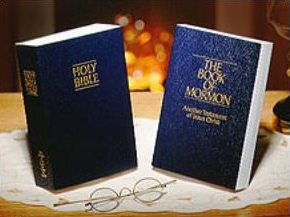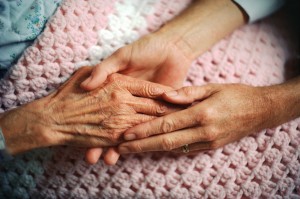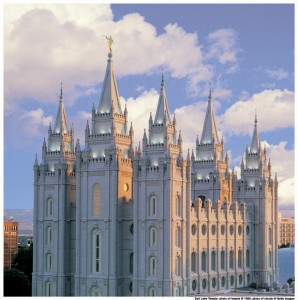Recently, the nation has been talking about a series of recent events at Brigham Young University (BYU), a college of 30,000+ students located in Provo, Utah. BYU is owned and operated by the Church of Jesus Christ of Latter-day Saints, and (as of last week) featured the third-ranked men’s basketball team in America, as well as (arguably) the nation’s best player, Jimmer Fredette. On Tuesday, March 1, as the BYU Cougars were gearing up for a possible run at the NCAA basketball Final Four, news broke that the team’s starting center, 19-year-old Brandon Davies, had been suspended for a “BYU Honor Code violation.” Several news sources later reported that Davies’ violation consisted of premarital sex with his girlfriend.
For the past several days, newspapers, blogs, celebrities, and individuals all over the country have been sharing reaction, thoughts, and opinions about Brigham Young University, the Honor Code, and Davies’ suspension. In this post, we’d like to help set the record straight by answering a number of questions that we’ve seen in a variety of locations.
What is Brigham Young University, and what is the Honor Code?
BYU is a private university owned by the Church of Jesus Christ of Latter-day Saints. Located in Provo, Utah, 98.5% of its students are LDS. These students come from all 50 U.S. states and more than 100 different countries. The Honor Code is a code of conduct that BYU students are required to sign if they wish to attend the university. It is meant to help keep the atmosphere on campus consistent with the teachings of the LDS Church and includes standards on being honest, living a chaste and virtuous life, abstaining from alcohol and tobacco, and using clean language. All students are required to renew their commitment to the Honor Code each year by signing a form before being able to register for classes. The Honor Code website says: “Violations of the Honor Code may result in actions up to and including separation from the university.”
Note that not everything in the Honor Code corresponds to a doctrinal teaching in the LDS Church, although most of the standards in the Honor Code—including strict adherence to the Law of Chastity—do have their basis in the doctrines of the Church.
Do all college-aged Mormons sign the Honor Code, or only those at BYU?
An Honor Code of some sort exists at all of the colleges operated by the Church of Jesus Christ of Latter-day Saints, but students who don’t go to a Church-owned school do not sign an official Honor Code. I went to the University of Massachusetts at Amherst for a semester before I decided to transfer to BYU. At UMass, there was no Honor Code, but because of my beliefs and standards as a member of the Church, I adhered to most or all of the elements of the Honor Code even though I was not at a Church-operated school. (I ultimately transferred because I wanted to be around more people my age who shared my beliefs, including adherence to many of the standards in the Honor Code.)
How can you possibly go through college with no drugs, no sex, and even no coffee?
It’s not always easy for everyone, but it’s often not as hard as it sounds—especially at BYU, where members of the Church are surrounded by many others who feel the same way they do. Tens of thousands of students do it every year. (And it’s not just for Mormons. My sister, a Unitarian, spent her freshman year at a small liberal arts college in New England living in a dorm that had a non-religious honor code that forbade most of these same things.) See this post and this post for an explanation of why we believe that premarital sex and certain substances don’t need to be a part of “growing up in America today.” I’ll tell you one thing: I’m extremely grateful for the principles behind the Honor Code. And yes, I had plenty of fun in college without promiscuous sex or drugs/alcohol.
Note that caffeine, although not served on BYU campus, is not explicitly against the Honor Code, and I (for one) enjoy a good caffeinated Diet Coke and/or Dr. Pepper from time to time. So why no coffee or tea? There are a number of potential reasons, but as Dave wrote on this blog, “The Lord doesn’t often provide a clear why with His commandments. If you believe the Lord said it, then you’ll just have to trust Him. Frankly, He would know.”
Does Brandon Davies’ suspension mean that someone “told on him?”
Absolutely not. This has been one of the main criticisms of BYU during the past few days by those who likely don’t understand the Honor Code or the environment at BYU. It is extremely rare for someone to be “reported” to school authorities for a violation of the Honor Code. One of the most important beliefs present in Mormonism is that of individual responsibility. Those who violate the Honor Code are invited to follow their own standards, and to remember that they promised to live by these rules before they came to school. In fact, many of these principles are core to Mormons’ faith in the Savior, Jesus Christ. In Davies’ case, he felt genuine, personal remorse over having violated what he believes (and we agree with him!) to be a commandment of God. I can certainly tell you from personal experience that, when things aren’t right between me and my Heavenly Father, my first priority is always to fix the situation. That’s how Davies felt, according to those close to the situation.
Technically, he didn’t need to talk to his bishop—again, confession is voluntary—but he wanted to make things right between himself and his God; nobody could possibly have “told on him,” and nobody was trying to get him suspended due to any sense of self-righteousness or vengefulness. As a church leader at BYU, Davies’ bishop is obligated to approach university authorities when any student (basketball player, artist, engineer, or otherwise) violates one of the most important elements of the Honor Code, which is what this bishop did.
In rare cases where someone (for a variety of reasons, most of them bad) reports another student to university authorities, the school takes no action unless the person willingly and contritely admits to the violation (or unless there is hard and irrefutable evidence of a violation). There is no coercion or pressure put on students to confess such things, and nothing is done based on hearsay.
Is it BYU policy to publish the specifics of an Honor Code transgression?
All of these proceedings are typically handled privately, with extreme concern for the emotional and spiritual well-being of the student. It is regrettable in the extreme that Davies’ personal spiritual life became a matter of public interest. That should never have happened. Note that BYU took care not to release information about the nature of Davies’ Honor Code violation; when asked, BYU officials would only say “that Davies wasn’t involved in anything criminal that resulted in his dismissal from the team.” Information about the sexual nature of the violation came from an unknown source, but definitely not through official Brigham Young University channels.
Would Davies’ have been suspended for any violation of the Honor Code?
Almost certainly not. I’ve heard this question in a variety of forms over the past couple of days. Because the powers of procreation are so sacred, the Law of Chastity is one of the most important tenets of Mormon life. That’s the primary reason why the Honor Code takes that particular commandment so seriously.
Why are the standards different for a BYU student than they are for a member of the Church?
For the most part, the standards are no different for a BYU student, but the consequences may be. Attendance at BYU (and participation on its sports teams) is dependent on a student’s willingness to live by the Honor Code. In this case and others, a young person sought to begin the repentance process—just as any member of the Church might—but because Davies had agreed to uphold the Honor Code, there was an additional consequence that a non-student would not face. The Law of Chastity (and most of the Honor Code) reflects standards held by all members of the Church. Even though I am not a BYU student anymore, I still believe that my Heavenly Father wants me to keep the commandments described in the Honor Code, and I try to do so. (There are a few Honor Code rules that don’t correspond to church doctrine, such as rules surrounding facial hair for men, but that isn’t the issue here.)
Does everyone at BYU live by the Honor Code all the time?
Of course not. We’re all human, and that means we’re imperfect. We slip up. We fail. I don’t know anybody who lived by the entire Honor Code for four consecutive years while I was at BYU. It’s hard to do! But we certainly try. When we make mistakes, we repent. The fact that we all sin is one reason why the BYU community has been so loving toward Brandon Davies since this news broke. The two BYU basketball games since his suspension was announced have been filled with fans holding signs supporting Davies and letting him know that we want to see him come back strong (both athletically and spiritually), and that to at least a certain extent, each of us knows what he’s going through.
Couldn’t they have dealt with this after the basketball season?
Sure. Or they could have brushed it under the rug entirely. One NBA star weighed in and encouraged BYU to “let it slide” because Davies is just a kid. That isn’t the point. When students come to BYU, they agree to live by these standards. If BYU sacrifices its integrity just to keep a player on the basketball floor for a few weeks, then what does it stand for? It would become just like the large number of other colleges and universities throughout the country who do this sort of thing all the time. If you look around, you see student-athletes who get arrested for serious crimes and miss a game or two (or none at all!). You see teams vacating seasons and going on probation, and you see star players giving back awards that they won, only after scandals come to light. You see coaches who violate NCAA rules (to which they have also agreed) and are met with a minor slap on the wrist and are glorified by their fans.
BYU is different. It was designed to be different—a place where young people could come and succeed academically, athletically, and spiritually. BYU men’s basketball head coach Dave Rose explained it this way: “A lot of people try to judge if this is right or wrong, but it’s a commitment they make. It’s not about right or wrong, it’s about commitment.”
So yes, BYU could have done the questionable thing by dealing with this after the season and would have certainly enjoyed better odds of going deep into the NCAA tournament, but that isn’t what the university stands for. And, frankly, doing so wouldn’t have been fair to Davies, who wanted to deal with this situation right away regardless of the consequences.
A number of media members and national pundits have applauded BYU for valuing integrity more than winning. One wrote, “There should be respect for a school that stands by its values, apparently without any athletic department member saying, ‘Yeah, but what will this do to our [basketball ranking]?'”
Now that the BYU basketball team is clearly struggling, why not reinstate Davies?
See previous answer. It comes down to integrity. Either the commandments of God are important to BYU, or they aren’t. If they are important (and I promise you that they are), then you need to stick with the program, and you can’t waver just because there is a big carrot dangling in front of your nose. Believe it or not, there are still some things more important than basketball. (And I say that as a die-hard sports fan who is as big a BYU fan as anyone.)
Does an Honor Code violation mean that you are kicked out of school or shunned on campus?
In most cases, it actually means the opposite. As BYU Athletic Director Tom Holmoe described the situation with Brandon Davies, “The first thing we did was put our arms around him.” Davies (and anyone who violates the Honor Code) will be treated with love, respect, and compassion, not with derision, exclusion, or spite. As I mentioned above, you can see this in the way that BYU students and fans have responded to this news. Hundreds have joined Facebook groups such as one entitled “We Love Brandon Davies,” not to complain about the Honor Code, but rather to show their support for both the Honor Code and for a tremendous young man who deserves every bit of the kindness he is receiving.
It’s also worth noting that BYU president Cecil O. Samuelson, a church authority at nearly the highest level, took a whole day off of work last week to spend it with Brandon Davies to make sure he was doing well, given not only his transgression and the suspension, but also the unfortunate news leaks surrounding the nature of his Honor Code violation.
There may be a few small-minded and self-righteous people who would look down on someone for having violated the Honor Code, but that attitude is not in accordance with the gospel of Jesus Christ.
Also, there may be certain Honor Code violations (such as crimes), or repeat offenses, which do warrant suspension or expulsion from BYU, but that is not the case with Brandon Davies.
What happens when a non-Mormon comes to BYU? Does he/she still need to obey the Honor Code?
Yes. All students and faculty are required to sign the Honor Code before coming to BYU, whether or not they happen to believe in the spiritual principles behind it. In some cases, this leads to a cultural dissonance where the individual isn’t happy living by these standards. Occasionally, we see a non-LDS athlete come to BYU and then end up transferring to another school rather than continue to support the Honor Code.
Where can I learn more about all of this?
By now there are countless articles, sound bytes, and video clips discussing BYU, the Honor Code, and Brandon Davies’ suspension. Many are clouded with opinion or blatant misinterpretations, but here are a few that I have enjoyed.
Full content of the BYU Honor Code
BYU praised for Honor Code enforcement in Brandon Davies case
Is BYU’s Honor Code Too Tough for Today’s College Students? (Hint: The author says it isn’t.)
Former BYU star Danny Ainge discusses the Honor Code and Brandon Davies on Boston sports radio station WEEI
 “When holy men of God write or speak by the power of the Holy Ghost, their words “shall be scripture, shall be the will of the Lord, shall be the mind of the Lord, shall be the word of the Lord, shall be the voice of the Lord, and the power of God unto salvation” (Doctrine and Covenants 68:4). The official, canonized scriptures of the Church, often called the standard works, are the Bible, the Book of Mormon, the Doctrine and Covenants, and the Pearl of Great Price.”
“When holy men of God write or speak by the power of the Holy Ghost, their words “shall be scripture, shall be the will of the Lord, shall be the mind of the Lord, shall be the word of the Lord, shall be the voice of the Lord, and the power of God unto salvation” (Doctrine and Covenants 68:4). The official, canonized scriptures of the Church, often called the standard works, are the Bible, the Book of Mormon, the Doctrine and Covenants, and the Pearl of Great Price.” In addition to the four standard works above, we listen to the words of living prophets and apostles every six months in a general conference of the Church. They give us the counsel and words of Christ we need for the specific problems we are facing today – for example there just wasn’t the internet or video games or a TV to deal with when the Bible and Book of Mormon were written. We consider this modern counsel to be scripture as well.
In addition to the four standard works above, we listen to the words of living prophets and apostles every six months in a general conference of the Church. They give us the counsel and words of Christ we need for the specific problems we are facing today – for example there just wasn’t the internet or video games or a TV to deal with when the Bible and Book of Mormon were written. We consider this modern counsel to be scripture as well.


